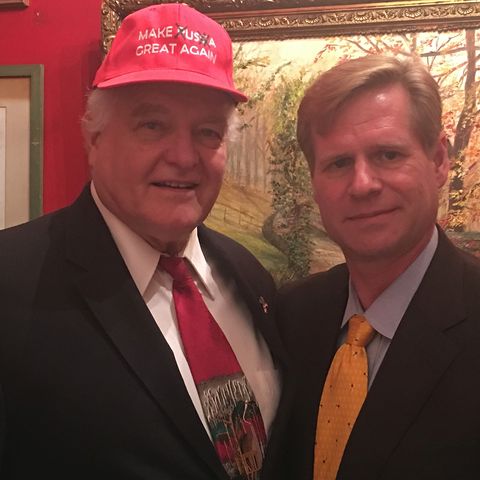Likability In The Race For President & SWBNO's Latest Struggles

Download and listen anywhere
Download your favorite episodes and enjoy them, wherever you are! Sign up or log in now to access offline listening.
Likability In The Race For President & SWBNO's Latest Struggles
This is an automatically generated transcript. Please note that complete accuracy is not guaranteed.
Description
Hy and Christopher take on the question Does Likeability Matter Most? Will the choice of “Minnesota Nice” Gov. Tim Walz double down on Kamala Harris’ pro-positivity strategy against Donald Trump?...
show moreChristopher leveled a challenge to Hy last week; sincerely say something nice about Kamala Harris! Unexpectedly, Hy’s response may explain why the Democratic and Republican Presidential candidates are tied in the battleground states. Hy McEnery replied to the question, “She has a nice smile. I have thought so since I first became aware of her.” As the socially conservative Baptist minister (who runs a charity working on behalf of troubled Inner City kids in New Orleans) described, he meant his observation as a true compliment—without irony.
However, he's still was voting for Trump, who had Hy's ardent support as a “fighter." Nevertheless, two of us examine whether this positive perception provides a clue as to why national polls have tightened—as swing voters have gotten to know Harris in the weeks after President Biden‘s demurral.
It is never a disadvantage for a presidential candidate to come off as a “Happy Warrior." That was the moniker applied to VP Hubert Humphrey when in 1968 he nearly overcame a grim two-time presidential candidate after his unpopular boss decided not to run for reelection. Positivity also stands as the main reason in the last few months of the 1980 campaign that Ronald Reagan prevailed over the somewhat gloomy incumbent Jimmy Carter. Undecided swing voters just liked Reagan more. A cheerful personality trumped policy weaknesses.
Three weeks ago, after Joe Biden withdrew from the presidential race, veteran Democratic strategist Doug Sosnik remarked to columnist William Kristol that the period until the August Democratic convention would be crucial. Vice President Kamala Harris stood relatively undefined in the minds of many voters. Who would prevail in the fierce race to define her?
As Kristol noted last week, “We’re now halfway through those four weeks, and Harris is winning the race to define. She and her campaign have over-performed in almost every respect while Donald Trump and JD Vance have gotten in their own way—or simply reminded us who they really are.”
“And Harris has gained ground," Kristol continued. "The polling team at UMass Amherst…has Harris leading Trump nationally by three points, 46 percent to 43 percent—compared to a four point lead for Trump over Biden in their January poll."
The important detail came when Kristol noted, “Harris leads Trump on personal characteristics like honesty and likability, but keeps the contest closer than one might have expected on traits that might have been thought big winners for Trump, like strength (only 54 percent to 46 percent) and patriotism (only 52 percent to 48 percent). And by 57 percent to 43 percent, voters think that Harris is more moderate than Trump, an indicator that the effort to define Harris as radical isn’t working—so far.”
Other surveys have seen similarly tightening polls, both nationally and in the battlegrounds. Does Likability trump ALL? Moreover, from the perspective of positivity without disturbing the delicate balance of ideological base politics, Kamala Harris’ Vice Presidential pick of Minnesota Gov. Tim Walz to be her running mate makes sense. His very nickname is “Minnesota Nice”. He enjoys high approval ratings from his constituents in his critical battleground home state— a trust often credited as the reason Democrats regained control of the state legislature after years out of power.
Unlike his two rivals for the VP slot, Walz holds no ideological heresies for the Left which could divide the Democratic base. He is not a strong supporter of school vouchers in Pennsylvania or the Israeli campaign in Gaza like Josh Shapiro, nor does he stand hesitant to support a repeal of “Right to Work” like Mark Kelly seemed to indicate when the Arizona Senator refused to sign on as a co-author of the PRO Act. Waltz actually tightened pro-unionization laws during his time in Minnesota Governor’s office.
Nevertheless, Walz comes off as a very nice, likable, middle-of-the-road type of guy. He stands attitudinally as the polar opposite of the ideological warrior exemplified by Trump’s choice of JD Vance, and that explains Kamala Harris choice of him better than anything else. That doesn’t mean he’s the best choice politically. Shapiro and Kelly arguably would’ve had more of an impact in swinging their swing states.
But Walz does no damage, as we discuss on today’s show, along with talking about some potential solutions for the recent boil advisories plaguing the NO S&WB—later in the show.
Information
| Author | News Talk 99.5 WRNO (WRNO-FM) |
| Organization | iHeartRadio |
| Website | - |
| Tags |
Copyright 2024 - Spreaker Inc. an iHeartMedia Company
